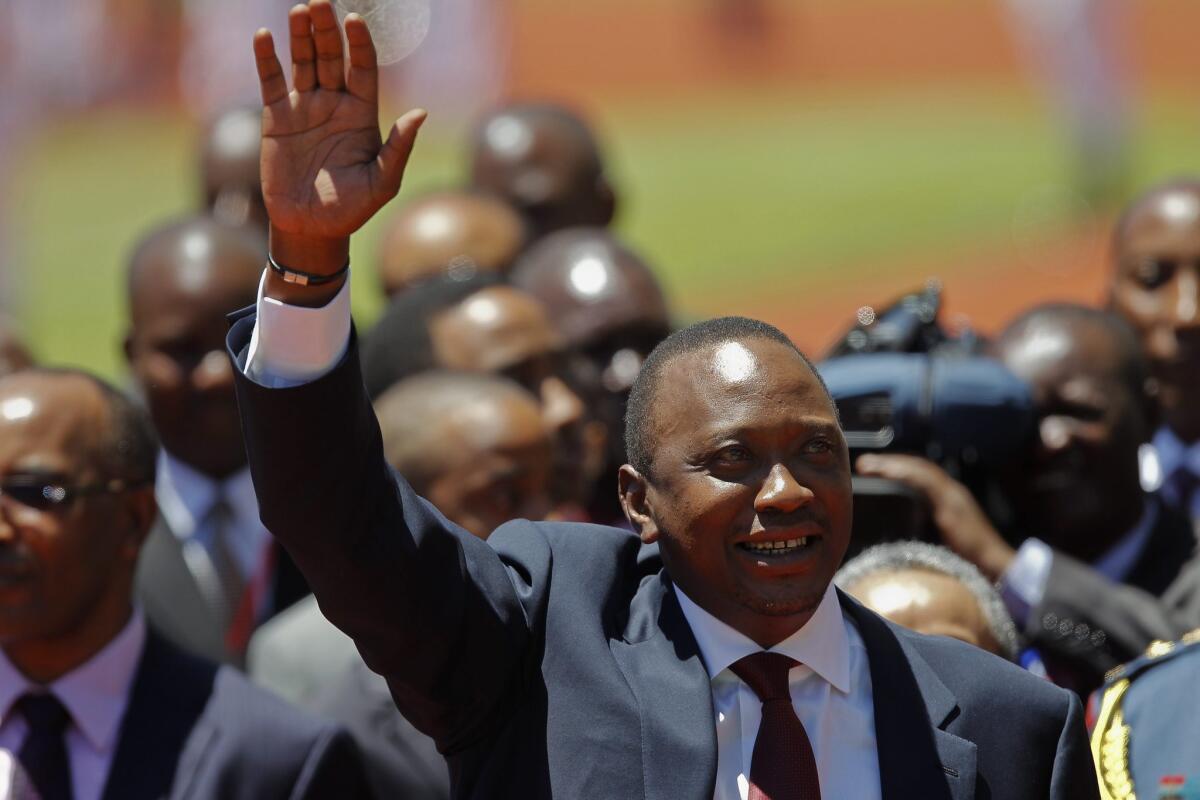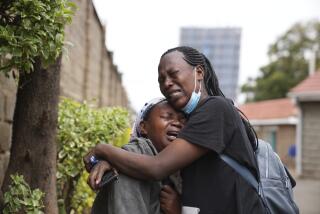Kenya’s new president sworn in amid divisions

NAIROBI, Kenya -- The swearing-in ceremony Tuesday for Kenyan President Uhuru Kenyatta, already one of the country’s richest and most powerful men, involved pomp, a 21-gun salute, an old Bible and controversy.
A dozen heads of state attended as Kenyatta swore the oath of allegiance on the same Bible his father, Jomo Kenyatta, held for his own swearing-in as founding prime minister in 1963.
For the son’s ceremony, Western nations sent diplomats rather than leaders as part of their policy of minimizing contact with men who have been indicted by the International Criminal Court.
Kenyatta, from one of Kenya’s most powerful dynasties, has been indicted by the court in The Hague on charges of crimes against humanity in connection with his alleged role inciting violence after the 2007 election that left more than 1,200 dead. His running mate, William Ruto, sworn in Tuesday as deputy president, has been indicted on similar charges.
Ugandan President Yoweri Museveni, who has held power since 1986, stirred controversy at the ceremony at Moi International Sport Center when he gave a speech sharply critical of the court and commending Kenyans for voting in leaders facing indictments by the court.
“I want to salute the Kenyan voters on the rejection of the blackmail by the ICC and those who seek to abuse this institution for their own agenda,” Museveni said. “I was one of those that supported the ICC because I abhor impunity.
“However, the usual opinionated and arrogant actors using their careless and shallow analysis have now distorted the purpose of that institution,” he added. “They are now using it to install leaders of their choice in Africa and eliminate the ones they do not like,” a remark apparently directed at the West.
Kenyatta and Ruto have promised to meet their international obligations and appear before the court. But analysts question who will be brave enough to testify at the court against Kenya’s two most powerful men. Some witnesses have already recanted or withdrawn.
“I assure you again that under my leadership Kenya will strive to uphold our international obligations, so long as these are founded on the well-established principles of mutual respect and reciprocity,” Kenyatta said in a speech at the ceremony.
Outgoing President Mwai Kibaki, from Kenyatta’s Kikuyu tribe, the country’s largest ethnic group, handed Kenyatta the instruments of power: a sword and a copy of the constitution.
The loser in the election, Raila Odinga, from the Luo tribe, who disputed the result and unsuccessfully challenged it in Kenya’s Supreme Court, didn’t attend.
Kenyatta avoided a runoff election by the narrowest of margins, about 8,000 votes. Odinga and a number of community organizations said the country’s electoral commission bumbled the count.
Observers will be watching Kenyatta’s government appointments closely to see whether he reaches out to different ethnic groups. In his speech, Kenyatta promised to be inclusive.
“We will leave no community behind,” he said. “Where there’s disillusionment, we’ll restore hope.”
Kenyans largely vote along ethnic lines. In Mathare, a Nairobi slum, Odinga supporters remained bitter, in a sign of the enduring ethnic tensions over political power. Many of them are Luos. A group of men stood around looking glum and speaking in low voices Tuesday.
“We’re not happy. There’s nothing to celebrate. It’s true Uhuru is the president of us all, but what we are saying is that this country doesn’t belong to one tribe,” said plumber Wyclif Osiewe, 37. “He will only make [tribalism] worse. If you look at what is happening so far, they are trying to undermine our people and sidelining them.”
He bemoaned Kenyatta’s strong grip on parliament. “They will be taking us to a one-party system,” he complained.
Kenyatta lived in State House, the presidential residence, as a boy, and newspapers were full of photographs showing him there with his father. Jomo Kenyatta, jailed for seven years by the British colonialists for his role in struggling for independence, is seen as Kenya’s founding father.
“Today is a big day for Kenyans, but not all Kenyans are happy and rejoicing,” said George Alunya, 40, a clothing trader in Mathare. “Kenya is one, but some people think they are better than others.”
ALSO:
North Korea warns foreigners to leave South Korea
Some mourn Margaret Thatcher’s death, others celebrate
American-born Israeli gets double life terms in Palestinian deaths
Soi reported from Nairobi and Dixon reported from Johannesburg, South Africa.
More to Read
Sign up for Essential California
The most important California stories and recommendations in your inbox every morning.
You may occasionally receive promotional content from the Los Angeles Times.










